The Mist Ending: What Happens, And How It Differs From The Book
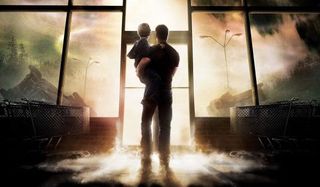
Warning: spoilers for The Mist are in play. If you haven't experienced the terror for yourself, bookmark this piece and come back.
With all of this talk about Stephen King movies in 2017, there's one movie that's been a recurring thought in our minds as of late: Frank Darabont's 2007 adaptation of The Mist. Blame it on how it's been the year for Stephen King adaptations or the fact that the Spike TV adaptation was cancelled. Hell, seeing Thomas Jane in this weekend's 1922 kind of drove the point home, as he's once again proven he's one of those actors that just gets King's work.
Most importantly, it's Halloween, and that's the time of year to indulge in what truly scares you. And if being stuck in a grocery store with an angry mob led by a religious zealot inside isn't something to be afraid of, having massive and unfriendly creatures waiting on the outside certainly is. Though the thing that scares us the most about The Mist is its ending, an occurrence so shocking that it's still one of the most harsh finales we've ever seen. It's an ending we need to discuss, and that's exactly what we're about to do. Prepare yourselves, as we're about to go back into The Mist.
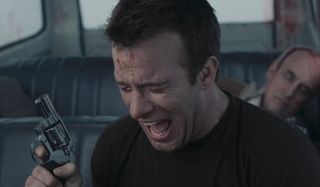
How The Movie Ends
After spending almost the whole movie cooped up in the supermarket, hiding from the creatures that make their home in The Mist, Thomas Jane's David Drayton leaves the safety of the building with a select group of people, in order to drive into the mist. The surviving party members find themselves stranded on the road, as the car they took runs out of gas mid-journey. Faced with the choice of either being ended by the monsters or by their own devices, the group allows David to shoot them all as an act of mercy. This includes David's young son, who's only eight years old at the time.
Unfortunately for David, there were five people and four bullets, leaving himself unable to finish his task by killing himself. So he walks outside, egging on fate to engage in what we've come to know is the standard operating procedure of The Mist: the prospect of a horrific monster eating him. Only, that doesn't happen. Apparently, the Army base that started this mess got the situation under control, and David sees this all too clearly when soldiers start to clean up the area around him. But the real kicker is when he sees truckloads of survivors from the supermarket they had fled, including a woman who previously wandered into the mist, played by The Walking Dead's Melissa McBride.
With his wife dead, and having just mercy killed everyone in his party including his young son, David realizes that if they'd stayed put just stopped for a single moment and thought things through, everyone would have been ok. He screams in pure madness, and the film ends. You can watch these last few moments for yourself, in the clip below.
That's not the end of the madness though, as if the movie's David knew the ending of the original Mist novella, he'd have gone even crazier.
CINEMABLEND NEWSLETTER
Your Daily Blend of Entertainment News
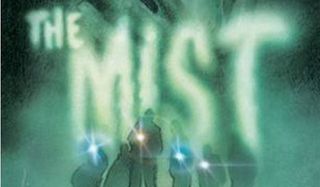
How The Book Ended
The novella The Mist ends pretty similar to the movie, with a daring escape being made by David, his son, and two others. What follows is a longer driving sequence that hits upon the heavily implied death of David's wife, and sees the crew making their way to a Howard Johnson's hotel near the state border. As he finishes writing the pages explaining the entirety of The Mist, he sets up the ending with the following caveat:
But you mustn't expect some neat conclusion. ... It is I suppose, what my father always frowningly called "an Alfred Hitchcock ending," by which he meant a conclusion in ambiguity that allowed the reader or viewer to make up his own mind about how things ended. My father had nothing but contempt for such stories, saying they were "cheap shots."
Rather than definitively ending, The Mist's literary form leaves its conclusion ambiguous, with the prospect of salvation being found in Hartford, Connecticut - based on David's apparently hearing that town's name in a brief radio transmission. He mulls over the thought that they can only make it so far on the amount of gas they have, even has a prospect to refuel the car. In the end, he kisses his son good night, and whispers "Hartford" and "Hope" to him.
So while The Mist has a bleak, unforgiving, and finite conclusion in Frank Darabont's adaptation, the novella has a more open ended conclusion that gives hope to David Drayton, his son, and the two women that followed them into the wild. Right about now, you're probably thinking to yourself, "why the hell did they change the ending?" Well, we've got some ideas on that, and they're supported by the King of horror himself.
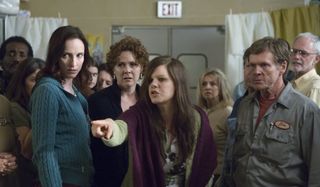
Why They Changed It
There was one big force behind changing the ending to The Mist for the theatrical adaptation, and it was Frank Darabont himself. When talking about the new conclusion in an interview, Stephen King explained how this came to be.
When Frank was interested in The Mist, one of the things that he insisted on was that it would have some kind of an ending, which the story doesn't have -- it just sort of peters off into nothing, where these people are stuck in the mist, and they're out of gas, and the monsters are around, and you don't know what's going to happen next. When Frank said that he wanted to do the ending that he was going to do, I was totally down with that. I thought that was terrific. And it was so anti-Hollywood -- anti-everything, really! It was nihilistic. I liked that. So I said you go ahead and do it.
When making The Mist in an era that saw the worldwide public dealing with the brutal realities of ongoing war and terrorism, it kind of made sense to beef up the ending into something that embraced a darker sense of realism. It would only be a year or so until The Dark Knight got in on the action, but Darabont and King saw the opportunity for a definitive and memorable ending, and took it.
Reading Stephen King's remarks on the ending, there's one key thing you have to keep in mind: the original story was written in 1980, which not only makes it one of King's earliest works, but also happens to be in the same year that Stanley Kubrick's The Shining made its way into theaters. Considering how much Stephen King hated the way The Shining was adapted, he's always had a bit of an anti-Hollywood bent on his mind, and who could blame him? It only makes sense that he would trust Frank Darabont, the man who made The Shawshank Redemption and The Green Mile into the successful adaptations they were. But the fact that this ending allowed King to get one up on Hollywood convention feels like it was the icing on his cake. Something he's never been shy of expressing since day one.
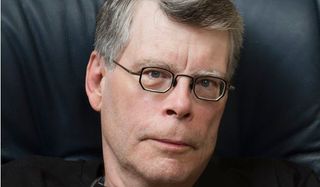
What King Thought Of The Ending
Needless to say, Stephen King is one of the biggest fans of the ending to The Mist's film adaptation, and that's not information that's new. While the previous quote about his approval of the ending came as early as a couple months ago, King was still cheerleading for the film's nihilist conclusion when the film was first released into the world. He'd said as much in an interview with USA Today around the time of the film's release, stating that:
The ending is such a jolt --- wham! --- it's frightening. But people who go to see a horror movie don't necessarily want to be sent out with a Pollyanna ending.
He only further poured the affection on Frank Darabont's thrilling end to David Drayton's adventures, as he doubled down in a press conference for The Mist's release and said this:
Frank wrote a new ending that I loved. It is the most shocking ending ever and there should be a law passed stating that anybody who reveals the last 5 minutes of this film should be hung from their neck until dead.
It's hard not to see Stephen King's glee for the fact that The Mist was not only going to bum out a bunch of new fans that had never experienced the material before, but also that loyal fans who read the book were about to be in for a bit of a shock themselves. After all, the man loves a good shock and/or scare at the expense of his audience, so why wouldn't he enjoy it if it fits into the parameters of the story that came before it? But is it truly the better ending?

Which Ending Was Better?
For hardcore Stephen King fans, picking a favorite ending to The Mist must is like Sophie's choice. But, taking both into consideration for their individual merits, there's some good points to be made. The ending to The Mist in novella form speaks to the dogged determination of our species. It's a hopeful ending that says we can make it, if only we push ourselves far enough, with enough smart thought behind our decisions. It's an inconclusive ending, but it allows for hope to flourish with the right thinking.
The ending to Frank Darabont's The Mist though is a dark, gut-punch of an ending, that shows a man on the wrong side of fate, with one less bullet than he needed. It is a bleak ending that does not rely on fate or indecision to lead the audience towards their own preferences, and it forces you to see its definitive conclusion in all of its dark glory, letting you decide to either accept or reject it on those standards alone.
In all honestly, I favor that second ending, purely because it feels more like the Stephen King I've come to know in a more modern context. Also, it's an ending so audacious in what it does, that you kind of have to respect it. But most importantly, it's an ending that brought The Mist into the modern age without having to change all that much about the story to begin with. The possibility for soul crushing defeat was always there in the world of David Drayton and his compatriots. All Frank Darabont did was give the story the push it needed, ultimately sealing everyone's fates.
This poll is no longer available.
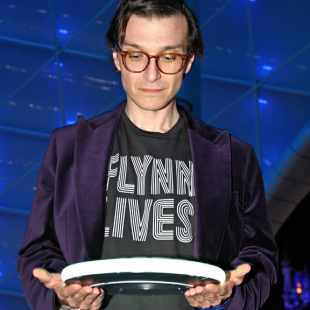
Mike Reyes is the Senior Movie Contributor at CinemaBlend, though that title’s more of a guideline really. Passionate about entertainment since grade school, the movies have always held a special place in his life, which explains his current occupation. Mike graduated from Drew University with a Bachelor’s Degree in Political Science, but swore off of running for public office a long time ago. Mike's expertise ranges from James Bond to everything Alita, making for a brilliantly eclectic resume. He fights for the user.
Most Popular





